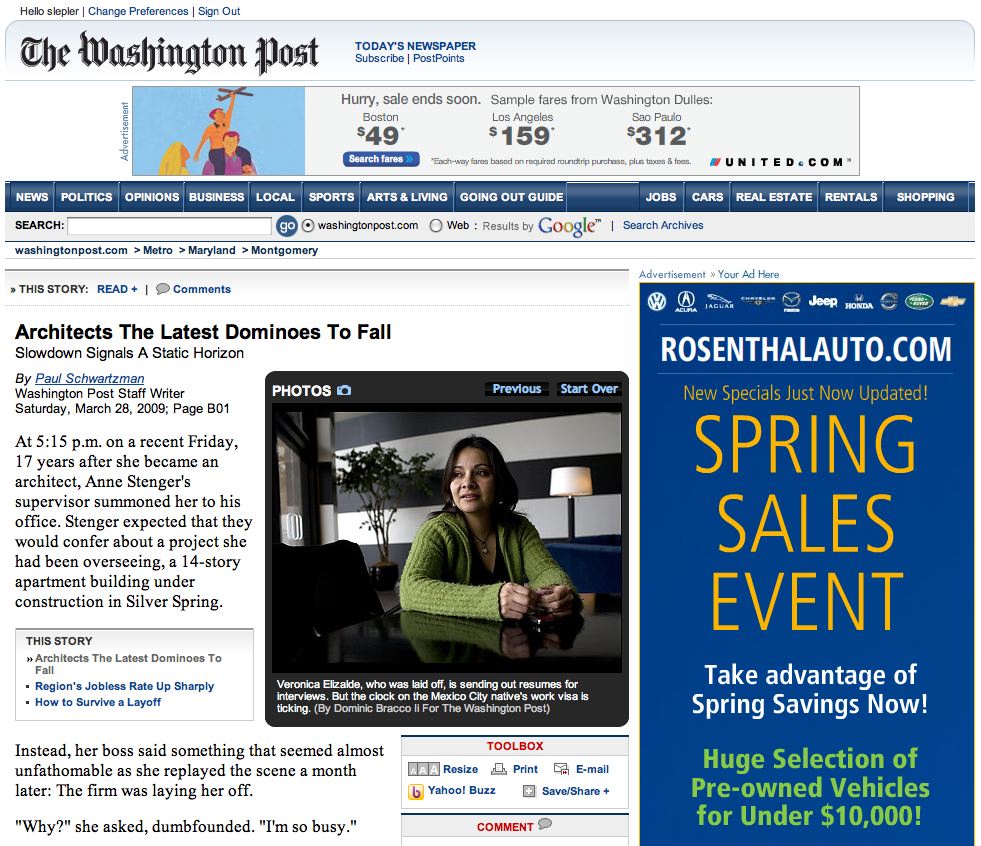I think I may have a reason why this recovery is floundering, and it all has to do with housing. Now stay with me a second, this is not subprime loans, nor predatory markets, or anything else that has already been blamed, this is a simple shift in how America lives and how that has affected our abilities to innovate and recover. Yes, I am talking about the shift from single family residences to Condo and Town home living, and the lovely association rules that come with both of those housing styles.
Last year, when I decided to start my own architecture firm (studiosml.com) I, like many prospective small business owners, hit upon a major stumbling block – my condo association bylaws. Specifically, they prohibit operating any business out of your unit. At the time, this felt like just another hurdle to get over, but now that I’ve had some distance and i’ve wathced our slow recovery, I have to wonder whether rules like this are impedeing others as well.
Let me explain. I wanted to start my architecture firm, and at least in the beginning, operate it out of my house. This is one of the very common and traditional ways that people start firms, it means a lot less overhead which translates into more funds for other startup costs like licensing fees, filing fees, accountants, lawyers, etc. Unfortunately, like many people in my generation I live in and own a condo and my condo association strictly forbids running any sort of business out of your unit. This is rather common, and its not just an issue with condo owners, many Home Owners Associations (HOAs) also forbid the homeowners within the community from conducting any businesses out of their homes. This means that not only can I, an architect, not start up a home based business, but someone who wants to run an internet based craft business, a one person maid service, or even a webdesigner cannot legally use their home address as a business address. Furthermore, in some states you can’t use a PO box as a business mailing address, it has to be headquartered somewhere where a person can sign for any legal documents. This means that with their home address off limits a prospective entrepreneur needs to rent an office or use one of the many new business “virtual office” services like Regus, which start at $100 a month minimum.
So why is this a new reason for a slow recovery? While I don’t have the hard numbers, in the two most recent recessions – 2000 and 1990, there were significantly less people living in condos and with HOAs. The only hurdle to starting a business in your house would be getting a local occupancy permit, which for most traditional home based businesses is not a problem. So, when people were laid off or put on furlough they were able start a home business to either provide a new source of income or supplement their reduced income. This means that their personal effect on consumer spending was not as greatly affected by the economic recession and they were able to make a greater contribution to the recovery effort.
Now, to bring the dreaded predatory lending and subprime loans into the picture; as people lose their homes they are forced to either move into apartment buildings or live with family. Both of these situations are incredible bad for small business. While some HOAs and Condo associations may make exceptions for certain types of businesses, it is universally accepted lease provision that you cannot run a business out of an apartment that is managed by a rental agency. This means that as the recession deepens people who could benefit most from reinventing themselves as entrepreneurs have an even greater hurdle to overcome. Furthermore, if they move in with a family member, they have to hope that they not only live in a space that allows home businesses but they also have to be receptive to having that new resident run a business out of their house.
So where does this leave us? I would propose that in an effort to jump start the small business economy State Legislatures should look at housing law and potential make it unlawful to prohibit someone from earning a living within their primary residence if their business met certain conditions. These would be things like: no employees, no costumer visits, nothing that violates noise rules of an HOA or Condo Association, no service may be performed that can be a fire risk nor a health risk, etc. This would be a big step to allowing many americans, especially those in urban areas, to get themselves off of unemployment and back into being a productive member of sociaety.
